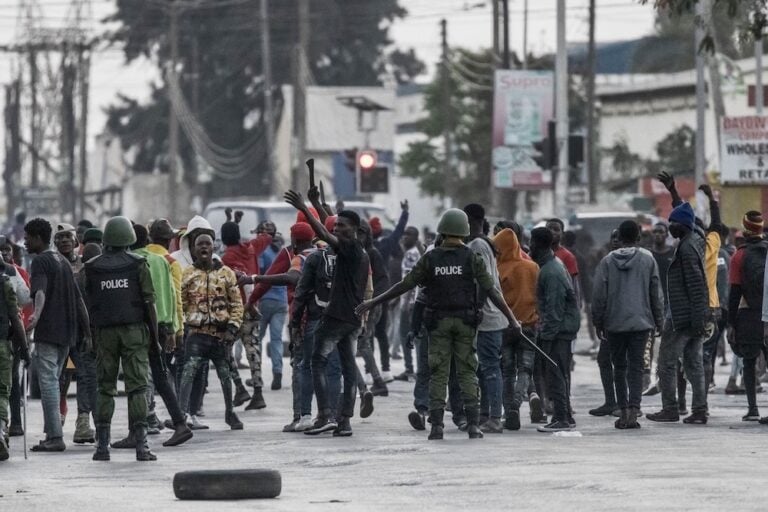**Updates IFEX alerts of 15 June, 29 and 12 May and 7 April 2000, 6 December, 26 and 2 November, 29 October, 25 May, 30, 19 and 1 April, 26, 25, 22, 19, 18, 17, 15, 12, 11 and 10 March 1999** (MISA/IFEX) – On 19 June 2000, the espionage trial of eleven journalists, who […]
**Updates IFEX alerts of 15 June, 29 and 12 May and 7 April 2000, 6 December, 26 and 2 November, 29 October, 25 May, 30, 19 and 1 April, 26, 25, 22, 19, 18, 17, 15, 12, 11 and 10 March 1999**
(MISA/IFEX) – On 19 June 2000, the espionage trial of eleven journalists, who were working for the “Post” newspaper at the time of their arrest, closed with the defence calling for their acquittal.
Defence lawyer Sakwiba Sikota said in his submission to Lusaka High Court judge Elizabeth Muyovwe that there was no basis upon which his clients could be found guilty because the State had failed to prove the identity of the author of the allegedly incriminating article.
Furthermore, the alleged classified information about Zambia’s inadequate military capacity compared to that of Angola was already publicly available in various magazines and on the Internet. Various state witnesses failed to prove that the information contained in the “Post” article was classified.
In any case, even the Zambian president was on record as saying that Zambia and Angola enjoyed friendly relations. Therefore any revelation about Zambia’s military incapacity could not advantage Angola because the two countries were not at war. If anything, it was a well known fact that Zambia’s military capability was far below that of Angola and a statement of this known fact did not give Angola any advantage.
The fact that the information was published in a newspaper and not given to the Angolans secretly also nullified the argument that the “Post” was engaged in espionage. Sikota stated that merely working for the “Post” did not mean that any of the accused wrote the story.
But the prosecution insisted that there was a prima facie case of espionage against the eleven. All of them needed to be convicted because they worked for the “Post” at the time of their arrest. The prosecution added that publishing such information prejudiced the country’s security, because of the insecurity in the southern African region.
Judgement will be handed down on 4 August.
BACKGROUND:
The case dates back to 10 March 1999, when police began a general swoop against reporters from the newspaper after it published a story a day earlier headlined “Angola worries Zambia Army, ZAF”. The story questioned Zambia’s ability to withstand an attack from Angola at a time when relations between the two countries were soured over persistent press reports alleging that Zambia was aiding rebels from the Angolan Union for the Total Independence of Angola (UNITA).
Six journalists, including Brighton Phiri, Lubasi Katundu, Kelvin Shimo, Goodson Machona and Joe Kaunda, were initially arrested and detained for two days on possible charges of espionage, but were released by the Lusaka High Court on 12 March when they successfully challenged their detention via a Habeas Corpus hearing. The state’s case collapsed because the arrests were improperly carried out.
However, the state began re-arresting the journalists and charging them with espionage from 20 March until the total number arrested reached thriteen by the time the case was transferred to the High Court from the Magistrate’s Court on 16 April. Two journalists, Amos Malupenga and Mukalya Nampito, were later released when the state decided to drop the charges against them, leaving only eleven accused. The names of the eleven other accused are: editor-in-chief Fred M’membe and journalists Douglas Hampande, Reuben Phiri, Macpherson Muyumba, Dickson Jere, and Liseli Kayumba.


